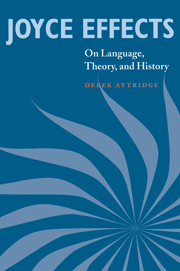Book contents
- Frontmatter
- Contents
- Acknowledgments
- References and abbreviations
- Preface
- Introduction: On being a Joycean
- Chapter 1 Deconstructive criticism of Joyce
- Chapter 2 Popular Joyce?
- Chapter 3 Touching ‘Clay’: reference and reality in Dubliners
- Chapter 4 Joyce and the ideology of character
- Chapter 5 ‘Suck was a queer word’: language, sex, and the remainder in A Portrait of the Artist as a Young Man
- Chapter 6 Joyce, Jameson, and the text of history
- Chapter 7 Wakean history: not yet
- Chapter 8 Molly's flow: the writing of ‘Penelope’ and the question of women's language
- Chapter 9 The postmodernity of Joyce: chance, coincidence, and the reader
- Chapter 10 Countlessness of livestories: narrativity in Finnegans Wake
- Chapter 11 Finnegans awake, or the dream of interpretation
- Chapter 12 The Wake's confounded language
- Chapter 13 Envoi: judging Joyce
- Works cited
- Index
Introduction: On being a Joycean
Published online by Cambridge University Press: 22 September 2009
- Frontmatter
- Contents
- Acknowledgments
- References and abbreviations
- Preface
- Introduction: On being a Joycean
- Chapter 1 Deconstructive criticism of Joyce
- Chapter 2 Popular Joyce?
- Chapter 3 Touching ‘Clay’: reference and reality in Dubliners
- Chapter 4 Joyce and the ideology of character
- Chapter 5 ‘Suck was a queer word’: language, sex, and the remainder in A Portrait of the Artist as a Young Man
- Chapter 6 Joyce, Jameson, and the text of history
- Chapter 7 Wakean history: not yet
- Chapter 8 Molly's flow: the writing of ‘Penelope’ and the question of women's language
- Chapter 9 The postmodernity of Joyce: chance, coincidence, and the reader
- Chapter 10 Countlessness of livestories: narrativity in Finnegans Wake
- Chapter 11 Finnegans awake, or the dream of interpretation
- Chapter 12 The Wake's confounded language
- Chapter 13 Envoi: judging Joyce
- Works cited
- Index
Summary
MAINLY AUTOBIOGRAPHICAL
I was taught not to like Joyce. The semicolonial experience I shared with him did not count for anything in the literary education I received during the 1950s at an all-white English-medium South African high school, which – in spite of being in the state education system – modelled itself on a certain idea of the Victorian public school. I remember being taught Shakespeare and Shaw, George Eliot and the Georgian poets, but little that could be called ‘modernist’. (However, I used school prize money to buy anthologies of recent poetry, and discovered in the work of a writer named Dylan Thomas a linguistic exuberance that at once baffled and excited me.) The English department at the university to which I proceeded in the early 1960s, also in South Africa, broadened my horizons considerably, but still within strict bounds. As was the case with many colonial English departments, its guiding spirit was the English critic F. R. Leavis, and the curriculum was based, for poetry, on the winnowed canon he presented in Revaluation and New Bearings, for fiction, on the equally circumscribed list of writers celebrated in The Great Tradition, and, for methodology, on ‘close reading’ or ‘practical criticism’ (for behind Leavis was the influential figure of I. A. Richards).
- Type
- Chapter
- Information
- Joyce EffectsOn Language, Theory, and History, pp. 1 - 21Publisher: Cambridge University PressPrint publication year: 2000



